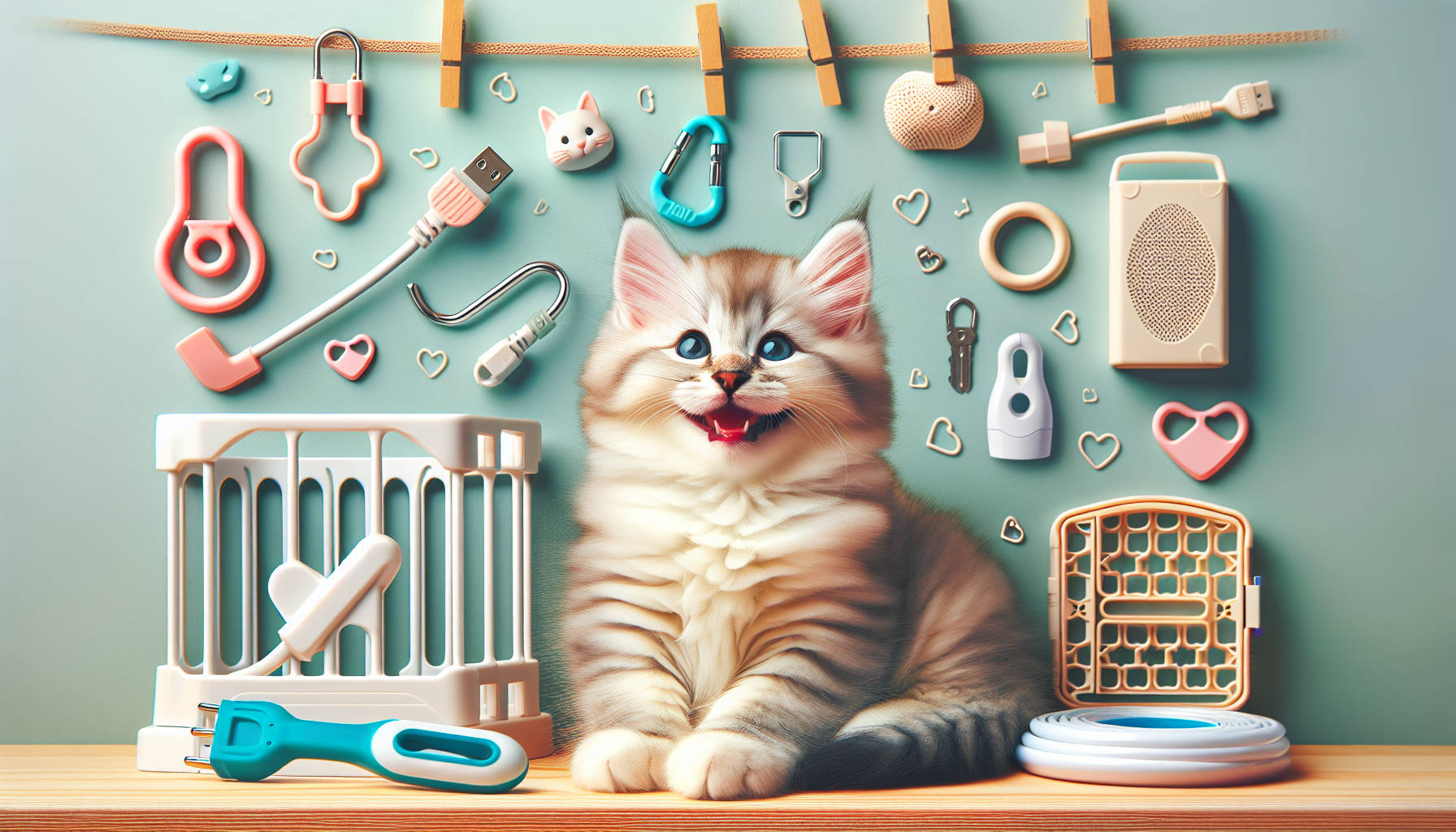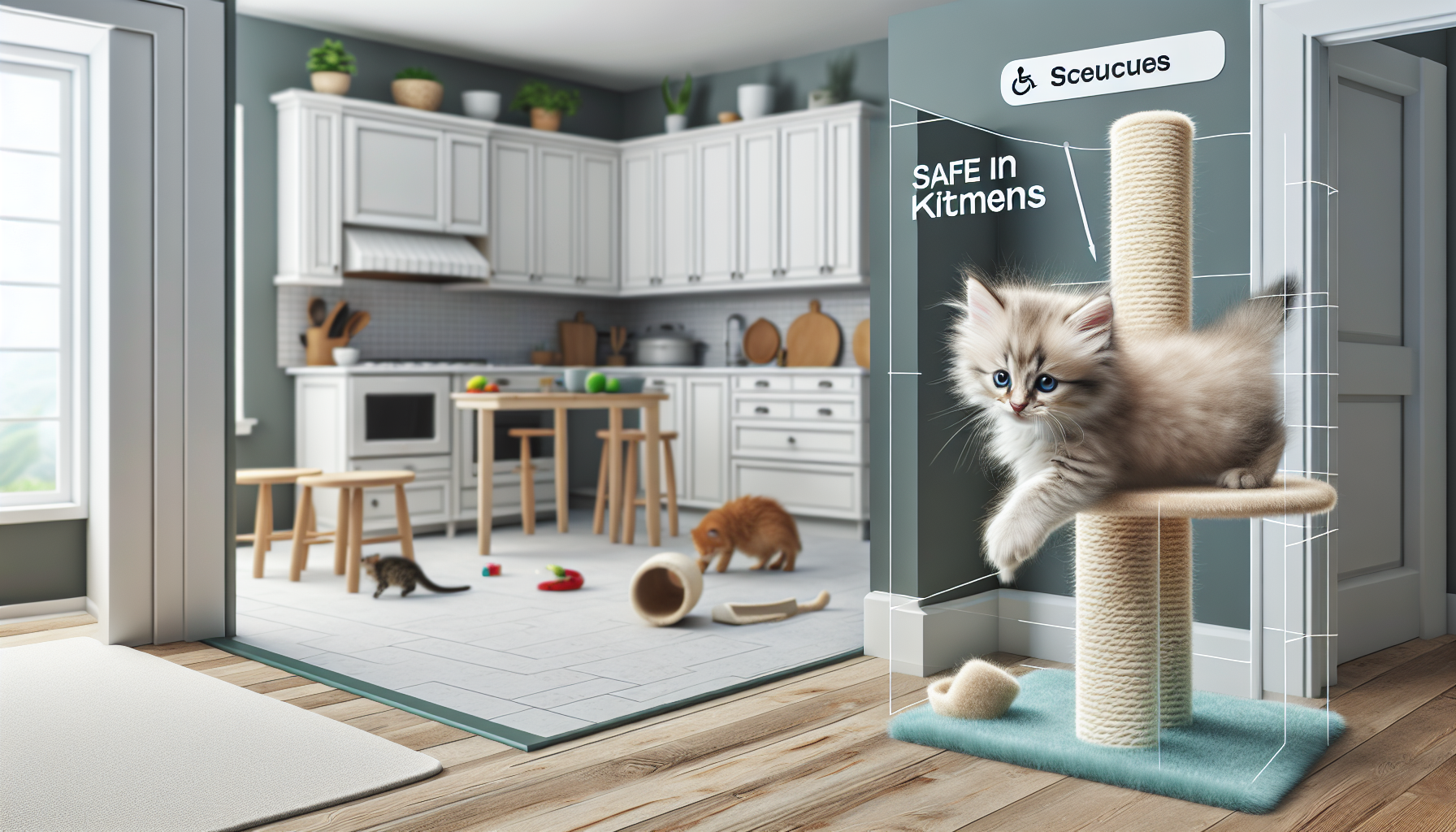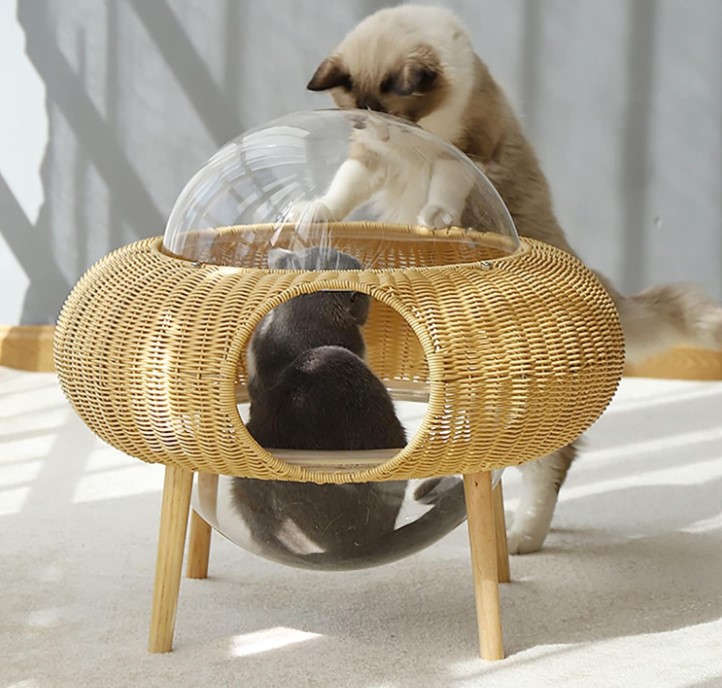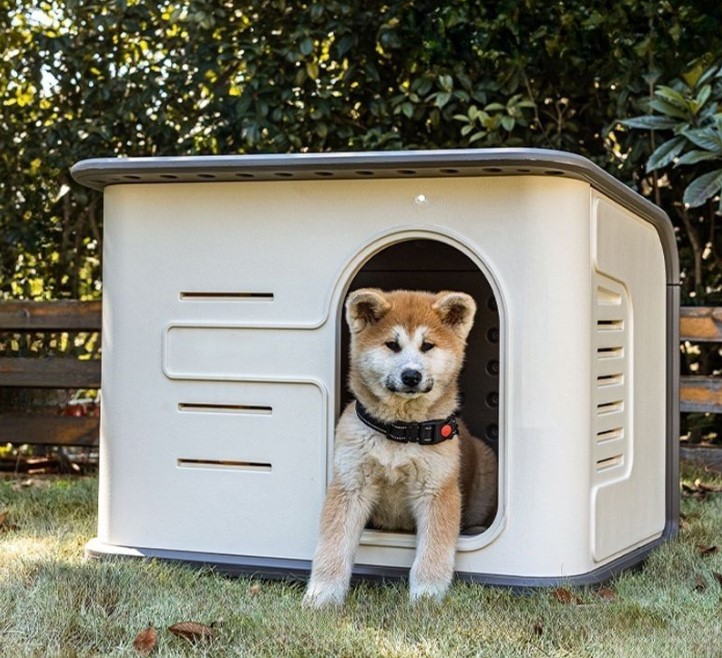The Ultimate Guide to Kitten-Proofing and Raising a Happy, Healthy Cat

Welcoming a new kitten into your home can be a thrilling experience, but it can also be overwhelming. As a responsible pet owner, you want to ensure that your little ball of fur grows into a happy and healthy adult cat. However, kittens are naturally curious, and their curiosity can often lead to trouble. From chewing on electrical cords to knocking over vases, it’s essential to take proactive measures to kitten-proof your home and prevent unwanted behavior.
In this article, we’ll delve into the world of kitten behavior, exploring why curiosity can be a curse, and what you can do to channel their energy into positive activities. We’ll provide you with practical tips on how to kitten-proof your home, room by room, and offer advice on how to establish clear boundaries and routines for your kitten. By understanding your kitten’s behavior and taking the necessary steps to prevent unwanted behavior, you can create a safe and nurturing environment for your little one to thrive.
By the end of this article, you’ll be equipped with the knowledge and skills to stay one step ahead of your kitten’s mischievous behavior and help them develop into a well-behaved and loving companion.
1. Understanding Kitten Behavior: Why Curiosity Can Be a Curse
Kittens are naturally curious creatures, driven by an innate desire to explore and investigate their surroundings. This curiosity is an essential aspect of their development, as it helps them learn and adapt to their environment. However, this curiosity can often lead to trouble, as kittens may not have the cognitive ability to distinguish between what’s safe and what’s not. They may ingest harmful substances, get into electrical outlets, or even injure themselves while trying to navigate their surroundings.
One of the primary reasons behind a kitten’s curiosity is their instinctual need to hunt and explore. In the wild, kittens rely on their curiosity to locate prey and navigate their territory. While this instinct is essential for survival, it can be problematic in a domestic setting. Kittens may view household items as potential prey, leading to unwanted behavior such as pouncing on cords or chasing small objects.
Understanding the reasons behind your kitten’s curiosity is crucial in preventing unwanted behavior. By recognizing the driving forces behind their curiosity, you can take steps to channel their energy into positive activities. This can include providing appropriate toys and stimulation, as well as kitten-proofing your home to prevent accidents. By doing so, you can create a safe and nurturing environment for your kitten to grow and thrive.
The Importance of Kitten Socialization
Socialization is a critical component of a kitten’s development, playing a significant role in shaping their behavior and personality. Proper socialization during the early stages of a kitten’s life can have a lasting impact on their confidence, temperament, and overall well-being. Kittens that are well-socialized are more likely to develop into friendly, outgoing, and curious adult cats, whereas those that are poorly socialized may become fearful, aggressive, or withdrawn.
Socialization is not just about exposing your kitten to people, but also to new environments, sights, sounds, and experiences. A well-socialized kitten is better equipped to handle new situations, making them more adaptable and resilient. Socialization can also help prevent behavioral problems, such as fear aggression or anxiety, by teaching your kitten to cope with stress and uncertainty.
The ideal window for socialization is between 2-14 months of age, with the most critical period being between 2-7 months. During this time, it’s essential to introduce your kitten to a variety of stimuli, including people, other animals, and novel environments. This can be achieved through gentle handling, play, and exposure to new experiences. By prioritizing socialization, you can help your kitten develop into a confident, friendly, and well-adjusted adult cat.
Kitten Instincts: Hunting and Exploring
Kittens are natural-born predators, equipped with instincts that drive them to hunt and explore their surroundings. These instincts are essential for survival in the wild, but they can also lead to unwanted behavior in a domestic setting. Your kitten’s instinct to hunt may manifest in various ways, such as pouncing on toys, strings, or even small objects like paper clips or pens. While this behavior may seem harmless, it can be problematic if your kitten targets electrical cords, toxic substances, or other hazardous items.
Exploratory behavior is another natural instinct that can lead to trouble. Kittens are naturally curious, and their instinct to explore can drive them to investigate every nook and cranny of their environment. This can lead to unwanted behavior, such as climbing onto high surfaces, digging into cupboards, or getting into tight spaces. While it’s essential to allow your kitten to exercise their natural instincts, it’s equally important to ensure that their explorations are safe and supervised.
Understanding your kitten’s natural instincts can help you identify potential problem areas and take steps to mitigate unwanted behavior. By providing appropriate outlets for your kitten’s instincts, such as toys and scratching posts, you can redirect their energy into positive activities. This can help prevent accidents, reduce stress, and create a more harmonious living environment for both you and your kitten.
2. Kitten-Proofing Your Home: A Room-by-Room Guide

Kitten-proofing your home is an essential step in ensuring your kitten’s safety and well-being. A thorough room-by-room assessment can help you identify potential hazards and take steps to mitigate them. Start with the living room, where your kitten is likely to spend most of their time. Remove any breakable or hazardous items, such as vases, candles, or electrical cords, and replace them with kitten-friendly alternatives. Consider investing in kitten-proof furniture, such as a scratching post or a cat tree, to provide your kitten with a safe and comfortable place to relax and play.
Next, move on to the kitchen, where your kitten may be tempted to explore the countertops and cabinets. Secure any loose items, such as kitchen utensils or cleaning supplies, and store them in high cabinets or on high shelves. Consider installing childproof locks on cabinets and drawers to prevent your kitten from accessing hazardous substances. Don’t forget to check the kitchen floor for any hazardous materials, such as cleaning products or medications, and store them in a safe and secure location.
By kitten-proofing each room in your home, you can create a safe and nurturing environment for your kitten to grow and thrive. Remember to stay vigilant and adaptable, as your kitten’s needs and behaviors will change over time. With a little creativity and planning, you can create a kitten-friendly home that is both safe and enjoyable for both you and your kitten.
Secure Those Cords: Preventing Electrical Shocks
Electrical cords and outlets can be a major hazard for curious kittens. According to the ASPCA, electrical shock is one of the most common injuries seen in kittens. To prevent electrical shocks, it’s essential to take steps to secure those cords and outlets. Start by moving any cords or wires out of reach of your kitten. This can include unplugging appliances when not in use, using cord concealers or cord organizers, and securing cords with cable ties or cord clips.
Another important step is to install outlet covers or tamper-resistant outlets. These can help prevent your kitten from inserting their paws or objects into the outlet, reducing the risk of electrical shock. You can also consider using cord protectors or cord shields, which can help prevent your kitten from chewing on cords.
By taking these simple steps, you can significantly reduce the risk of electrical shock and create a safer environment for your kitten. Remember to stay vigilant and monitor your kitten’s behavior around electrical cords and outlets. If you suspect your kitten has been electrocuted, seek immediate veterinary attention. With a little caution and planning, you can keep your kitten safe and healthy.
Toxic Substances: Keeping Your Kitten Safe from Harm
As a responsible pet owner, it’s essential to be aware of the common household substances that can be toxic to your kitten. According to PetMD, some of the most common toxic substances include cleaning products, medications, pesticides, and certain foods. These substances can be harmful to your kitten if ingested, and can cause a range of symptoms from mild to severe. To keep your kitten safe, it’s crucial to keep these substances out of reach and to take steps to prevent accidental ingestion.
One of the most effective ways to keep toxic substances out of reach is to store them in high cabinets or on high shelves that are inaccessible to your kitten. You should also consider using childproof locks or latches to secure cabinets and drawers that contain hazardous substances. Additionally, it’s essential to read labels carefully and to follow instructions for use and storage. If you suspect that your kitten has ingested a toxic substance, seek immediate veterinary attention.
Some common household substances that are toxic to kittens include antifreeze, rat poison, and certain medications. Chocolate, grapes, and onions are also toxic to kittens and should be kept out of reach. By taking steps to keep these substances out of reach and by being aware of the potential risks, you can help prevent accidental poisoning and keep your kitten safe and healthy. Remember to always consult with your veterinarian if you have any concerns about your kitten’s health or safety.
3. Distracting Your Kitten: Positive Reinforcement and Redirecting
Redirecting your kitten’s attention away from trouble and towards positive activities is an essential skill for any pet owner. By using positive reinforcement and redirection techniques, you can encourage your kitten to focus on desirable behaviors and distractions, rather than unwanted ones. One effective way to do this is to provide your kitten with a variety of stimulating toys and activities that challenge their mind and body. This can include puzzle toys, feather wands, and scratching posts.
When you catch your kitten engaging in unwanted behavior, such as scratching furniture or chewing on electrical cords, calmly redirect their attention to a suitable alternative. For example, if you see your kitten scratching the furniture, immediately redirect them to a scratching post. Reward your kitten with praise, treats, and affection when they exhibit desired behavior. This positive reinforcement will help your kitten associate good behavior with rewards and encouragement.
By consistently redirecting your kitten’s attention and rewarding good behavior, you can help them develop healthy habits and a strong bond with you. Remember to be patient and consistent, as redirecting your kitten’s attention takes time and effort. With positive reinforcement and redirection techniques, you can help your kitten grow into a well-behaved and happy adult cat.
The Power of Play: Engaging Your Kitten’s Mind and Body
Play is a crucial aspect of a kitten’s development, and it plays a significant role in distracting them from unwanted behavior. Engaging your kitten’s mind and body through play can help redirect their attention away from trouble and towards positive activities. Play provides an outlet for your kitten’s natural energy and curiosity, helping to reduce the likelihood of destructive behavior. Moreover, play helps to strengthen the bond between you and your kitten, promoting trust and understanding.
When it comes to play, variety is key. Mixing up the types of toys and activities you provide can help keep your kitten engaged and stimulated. Consider using interactive toys, such as feather wands, laser pointers, and puzzles, which challenge your kitten’s problem-solving skills and encourage physical activity. You can also try rotations, where you introduce new toys and activities every few days to keep things fresh and exciting.
In addition to providing an outlet for energy and curiosity, play can also help to reduce stress and anxiety in kittens. By engaging your kitten in play, you can help them relax and unwind, reducing the likelihood of unwanted behavior. Remember, play is a two-way street, so be sure to get involved and have fun with your kitten! By making play a priority, you can help your kitten develop into a happy, healthy, and well-adjusted adult cat.
Rewarding Good Behavior: Positive Reinforcement Techniques
Positive reinforcement is a powerful tool for encouraging good behavior in your kitten. By rewarding desired behaviors, you can create a strong association between the behavior and the reward, encouraging your kitten to repeat the behavior in the future. One of the most effective ways to use positive reinforcement is through the use of treats. When your kitten exhibits good behavior, such as using the litter box or performing a trick, reward them with a treat. This can help to create a positive association with the behavior and encourage your kitten to repeat it.
In addition to treats, praise and affection can also be used as rewards. When your kitten exhibits good behavior, be sure to provide them with praise and affection, such as petting or cuddling. This can help to create a strong bond between you and your kitten and reinforce good behavior. Consistency is key when it comes to positive reinforcement, so be sure to reward your kitten every time they exhibit good behavior.
Another important aspect of positive reinforcement is timing. It’s essential to reward your kitten immediately after they exhibit good behavior, so they can associate the reward with the behavior. By using positive reinforcement techniques, you can encourage good behavior in your kitten and help them develop into a well-behaved and loving adult cat.
4. Setting Boundaries: Establishing a Routine and Rules
Establishing clear boundaries and a routine for your kitten is crucial for their development and behavior. A routine provides a sense of security and stability, helping your kitten feel calm and confident. By setting clear boundaries, you can help your kitten understand what is expected of them and what is not allowed. This can include rules such as not scratching furniture or not jumping on the counter.
To establish a routine, start by creating a schedule for your kitten’s daily activities, including feeding times, playtime, and sleep. Consistency is key, so try to stick to the same schedule every day, including weekends. You should also establish rules for your kitten’s behavior, such as not allowing them to scratch certain surfaces or not permitting them to enter certain areas of the house. Be sure to communicate these rules clearly and consistently, using positive reinforcement techniques to encourage good behavior.
By setting clear boundaries and establishing a routine, you can help your kitten develop good habits and behaviors. A routine can also help to reduce stress and anxiety in kittens, as they know what to expect and can feel more secure. Remember to be patient and consistent when establishing a routine, as it may take some time for your kitten to adjust. With time and effort, you can help your kitten develop into a well-behaved and happy adult cat.
Creating a Schedule: Feeding, Play, and Sleep
Creating a schedule for your kitten is essential for their development and behavior. A schedule provides a sense of structure and routine, helping your kitten feel secure and confident. A good schedule should include regular times for feeding, play, and sleep. Feeding times should be spaced out evenly throughout the day, with kittens typically requiring 3-4 meals per day. Playtime should be scheduled regularly, with a mix of physical and mental stimulation to keep your kitten engaged and active.
Sleep is also an essential part of a kitten’s schedule, with most kittens requiring 16-18 hours of sleep per day. Establishing a consistent sleep schedule can help regulate your kitten’s sleep patterns and ensure they get enough rest. When creating a schedule, be sure to consider your own lifestyle and schedule, as well as your kitten’s individual needs and preferences. A flexible schedule that can be adjusted as needed is key.
By creating a schedule that works for you and your kitten, you can help promote healthy development and behavior. A schedule can also help reduce stress and anxiety in kittens, as they know what to expect and can feel more secure. Remember to be patient and consistent when implementing a schedule, as it may take some time for your kitten to adjust. With time and effort, you can help your kitten develop into a happy and healthy adult cat.
Disciplining Your Kitten: Dos and Don’ts
Disciplining your kitten is an essential part of their development and training. However, it’s crucial to discipline your kitten effectively and humanely, avoiding punishment and focusing on positive reinforcement. The goal of discipline is to teach your kitten right from wrong, not to punish them for misbehaving. When disciplining your kitten, it’s essential to be calm and patient, avoiding physical punishment or yelling.
Instead of punishment, focus on redirecting your kitten’s behavior towards a more desirable action. For example, if your kitten is scratching the furniture, redirect their attention to a scratching post. Reward your kitten with treats and praise when they exhibit good behavior, such as using the scratching post. Consistency is key when disciplining your kitten, so be sure to set clear boundaries and rules.
Remember, discipline is not about punishing your kitten, but about teaching them and guiding them towards good behavior. By disciplining your kitten effectively and humanely, you can help them develop into a well-behaved and loving adult cat. Avoid using physical punishment, such as hitting or shaking, as this can lead to fear and aggression. Instead, focus on positive reinforcement and redirection to teach your kitten right from wrong.
5. Conclusion: Staying One Step Ahead of Your Kitten
In conclusion, kitten-proofing your home and staying one step ahead of your kitten’s mischievous behavior requires patience, consistency, and positive reinforcement. By understanding your kitten’s natural instincts and behavior, you can take steps to prevent unwanted behavior and create a safe and nurturing environment. Remember to stay calm and patient, avoiding punishment and focusing on positive reinforcement techniques.
To stay ahead of your kitten’s behavior, it’s essential to be proactive and anticipate potential problems. Keep an eye on your kitten at all times, especially during the early stages of development. Provide plenty of stimulation and exercise to keep your kitten engaged and active, and reward good behavior with treats and praise.
By following the tips and advice outlined in this article, you can help your kitten develop into a well-behaved and loving adult cat. Remember to stay flexible and adapt to your kitten’s changing needs and behaviors. With patience, consistency, and positive reinforcement, you can create a strong bond with your kitten and enjoy a lifelong friendship.
Staying Patient and Consistent
Patience and consistency are crucial elements in keeping your kitten out of trouble. Kittens are naturally curious and mischievous, and they require a gentle and guiding hand to navigate their surroundings. Without patience and consistency, your kitten may become confused and develop unwanted behaviors. When disciplining your kitten, it’s essential to remain calm and patient, avoiding physical punishment or yelling.
Consistency is key in setting boundaries and rules for your kitten. By establishing a clear and consistent routine, your kitten will learn what is expected of them and what is not allowed. Consistency also helps to build trust and confidence between you and your kitten, allowing them to feel more secure and comfortable in their environment. Remember, patience and consistency are not just important for discipline, but also for building a strong and loving bond with your kitten.
By staying patient and consistent, you can help your kitten develop into a well-behaved and loving adult cat. Avoid getting frustrated or angry with your kitten, as this can lead to fear and aggression. Instead, focus on positive reinforcement and redirection to teach your kitten right from wrong. With patience and consistency, you can create a safe and nurturing environment for your kitten to thrive.
How can I keep my kitten away from electrical cords?
You can keep your kitten away from electrical cords by using cord protectors or cord concealers, which can be found at most pet stores or online. You can also try placing cords out of reach or using a cord organizer to keep them tidy and inaccessible to your kitten.
What are some signs that my kitten is bored or needs more stimulation?
Some common signs that your kitten is bored or needs more stimulation include destructive behavior, excessive meowing or whining, and restlessness. If you notice these signs, try increasing playtime, providing more toys or puzzle toys, or creating a ‘kitten agility course’ to keep your kitten engaged and active.
Can I discipline my kitten using physical punishment?
No, it’s not recommended to discipline your kitten using physical punishment. Physical punishment can lead to fear, aggression, and anxiety in kittens. Instead, focus on positive reinforcement and redirection to teach your kitten right from wrong. Reward good behavior with treats and praise, and redirect bad behavior to a more desirable action.
How can I prevent my kitten from scratching furniture?
You can prevent your kitten from scratching furniture by providing scratching posts and pads, and placing them near areas where your kitten likes to scratch. You can also try using double-sided tape or aluminum foil to deter your kitten from scratching certain surfaces. Reward your kitten with treats and praise when they use the scratching post correctly.
How often should I play with my kitten?
You should play with your kitten at least 2-3 times a day, for 10-15 minutes each session. This can help to reduce boredom and destructive behavior, and strengthen the bond between you and your kitten. You can also try providing puzzle toys and interactive games to keep your kitten engaged and active.




